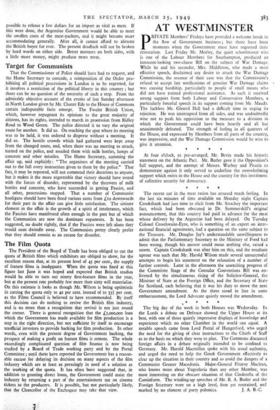AT WESTMINSTER
PRIVATE Members' Fridays have provided a welcome break in the flow of Government business ; but there have been moments when the Government must have regretted their restoration. Last Friday Mr. Morley, the quiet schoolmaster who is one of the Labour Members for Southampton, produced an innocent-looking two-clause Bill on the subject of War Damage. While he and his seconder, Mrs. Middleton, who made a most effective speech, disclaimed any desire to attack the War Damage Commission, the essence of their case was that the Commission's refusal to accept late notifications of genuine War Damage claims • was causing hardship, particularly to people of small means who did not have trained professional assistance. As such it received strong support from both Labour and Conservative Members, a particularly forceful speech in its support coming from Mr. Maude. The luckless Mr. Glenvil Hall had a difficult time in urging its rejection. He was interrupted from all sides, and was undoubtedly wise not to push his opposition to the measure, to a division in which the Government could have been heavily and all but unanimously defeated. The strength of feeling in all quarters of the House, and expressed by Members from all parts of the country, was impressive, and the War Damage Commission would be wise to give it attention.
* * * *
At four o'clock, as pre-arranged, Mr. Bevin made his historic statement on the Atlantic Pact. Mr. Butler gave it the Opposition's full support, and the attempt of Messrs. Warbey and Piratin to demonstrate against it only served to underline the overwhelming support which exists in the House and the country for this instalment of collective security for democracy.
* * * *
The recent cut in the meat ration has aroused much feeling. In the last six minutes of time available on Monday night Captain Crookshank had just time to elicit from Mr. Strachey the important fact, which had been obscured in Dr. Summerskill's original announcement, that this country had paid in advance for the meat whose delivery by the Argentine had been delayed. On Tuesday Colonel Crosthwaite-Eyre, who is something of an expert on inter- national financial agreements, had a question on the same subject to the Treasury. Mr. Douglas Jay's understandable unwillingness to admit that the Parliamentary Secretary to the Ministry of Food had been wrong, though his answer could mean nothing else, raised a storm. Captain Crookshank was after him on this, and the resultant uproar was such that Mr. Harold Wilson made several unsuccessful attempts to begin his statement on the relaxation of a number of further controls. Later in the afternoon the unexciting progress of the Committee Stage of the Consular Conventions Bill was en- livened by the simultaneous rising of the Solicitor-General, the Minister of State at the Foreign Office, and the Secretary of State for Scotland, each believing that it was his duty to move the next Government amendment. As the three stood in line in some embarrassment, the Lord Advocate quietly moved the amendment.
* * * * The big day of the week in both Houses was Wednesday. In the Lords a debate on Defence showed the Upper House at its best, with one of those quietly impressive displays of knowledge and experience which no other Chamber in the world can equal. A notable speech came from Lord Portal of Hungerford, who urged the need for the giving of clear instructions to the Chiefs of Staff as to the basis on which they were to plan. The Commons discussed foreign affairs in a debate originally intended to be confined to Germany. Mr. Harold Macmillan spoke with his usual authority, and urged the need to help the Greek Government effectively to clear up the situation in their country and so avoid the dangers of a Communist Greater Macedonia. Major-General Fitzroy Maclean, who knows more about Yugoslavia than any other Member, was most interesting on the obscure situation of that Cinderella of the Cominform. The winding-up speeches of Mr. R. A. Butler and the Foreign Secretary were on a high level, firm yet restrained, and marked by no element of party polemics. J. A. B.-C.














































 Previous page
Previous page